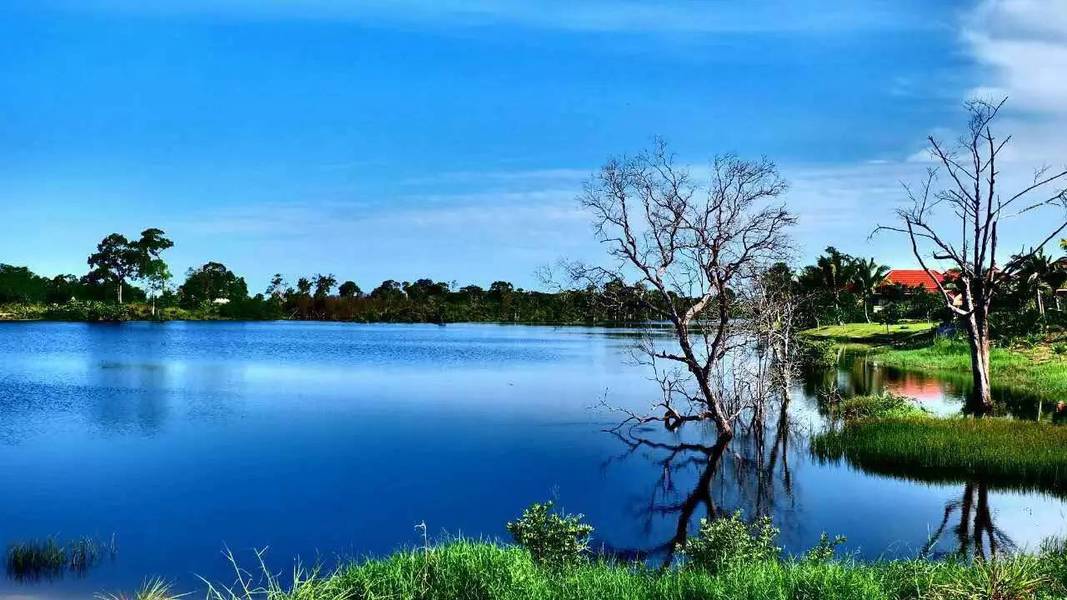Construction of the 173 miles Nicaragua canal by Hong Kong HKND to rival Panama begin December 22 2014. Who is businessman Wang Jing?
Johnson Choi-1008 11/21 492615.0/1
Construction of the 173 miles Nicaragua canal by Hong Kong HKND to rival Panama beginDecember 22 2014. Who is businessman Wang Jing?
Directly challenging American interests at the Panama Canal by a Hong Kong Company is one of the many reasons why United States launched Color Revolution in Hong Kong 香港公司直接挑戰美國在巴拿馬運河的利益是美國在香港發動顏色革命的其中一個原因

(Reuters) - Construction of Nicaragua's $50 billion Interoceanic Grand Canal, expected to rival the Panama Canal, will begin Dec. 22 after feasibility studies have been approved, the committee overseeing the project said on Thursday.
The route suggested for the 172-mile (278-km) canal, which would be longer, deeper and wider than the Panama Canal, was approved in July. Construction will be led by Hong Kong-based HK Nicaragua Canal Development Investment Co Ltd (HKND Group).
Opponents of the plan are concerned about the canal's effect on Lake Nicaragua, an important fresh water source for the country, as well as the impact on poorer communities.
Committee member Telemaco Talavera said the feasibility studies is approved. The plan is to finish the canal within five years, with it becoming operational around 2020.
Officials said some small adjustments were being made to the overall project, including dredging stretches of a lake rather than using underwater explosives.
The proposed canal would pass through Lake Nicaragua, Central America's largest lake, and will be between 230 meters and 520 meters (755 feet to 1,706 feet) wide and 27.6 meters (90 feet) deep, HKND has said.
HKND officials said the project will employ about 50,000 people directly, and indirectly benefit another 200,000.
"This project is going to be the biggest built in the history of humanity. It will be an enormous help to the Nicaraguan people and for the world in general, because world trade will require it, we are sure of this," Wang told students at the Managua University of Engineering.
Junsong said the canal project consists of six sub-projects, including the channel itself, construction of two deep-water ports, a free-trade area, tourism projects in San Lorenzo and an airport in the city of Rivas. Construction is expected to begin in December 2014 and is set to take five years.
Chinese businessman Wang Jing is behind the canal plan, though he has no prior experience developing or financing big infrastructure projects like the planned canal.
Wang only established Hong Kong Nicaragua Canal Development Investment Co (HKND) in August 2012.
(Reporting by Ivan Castro; Writing by Christine Murray and Simon Gardner; Editing by Alan Crosby)
Who is businessman Wang Jing? China's 'ordinary' billionaire behind grand Nicaragua canal plan BY MATTHEW MILLER
(Reuters) - Wang Jing, the enigmatic businessman behind Nicaragua's $50 billion Interoceanic Grand Canal, shrugs off scepticism about how a little-known entrepreneur can be driving a huge transcontinental project, insisting he's not an agent of the Beijing government.
"I know you don't believe me," said Wang, who reckons that he's forked-out about $100 million in canal preparation work, and is burning as much as $10 million a month on the project.
"You believe there are people from the Chinese government in the background providing support. Why, in the end, is only Wang Jing out front?"
High-ranking Chinese officials including President Xi Jinping, Premier Li Keqiang and former leaders Jiang Zemin and Wen Jiabao have all visited the state-connected wireless communication technologies company Wang took control of four years ago.
Wang, whose entrepreneurism went mostly unnoticed in China and elsewhere before last year's Nicaragua announcement and a subsequent $3 billion Black Sea port development plan, has not helped matters by refusing to talk in detail about himself or broad swathes of his career.
During two interviews at the headquarters of Beijing Xinwei Telecom Technology Inc and in several follow-up emails, the 41-year-old Wang discussed Nicaragua, Beijing Xinwei's recent deal to undertake the biggest reverse takeover in Chinese stock market history and his background, providing fresh details to a life that remains mysterious.
"I was born in December 1972 in Beijing," said Wang. "All these years I've lived a very ordinary life."
HIGH-WIRE ACT
Wang grabbed global headlines last June when he sealed a controversial no-bid 50-year renewable concession from Nicaragua's Sandinista government to develop the $50 billion canal to rival Panama's, and related facilities.
Nicaragua preparation is on schedule, Wang said. In January, he and President Daniel Ortega issued a joint statement to address what Wang described as "misleading reports" that the start of construction would be delayed.
The proposed scope is enormous, comprising construction of a waterway that may extend 130 miles, depending on the route selected, along with two ports, a railway, oil pipeline, and an international airport.
The canal would be longer, deeper and wider than the Panama Canal, about 500 miles to the southeast.
The scale of the project has led some to suggest it could only be viable with the backing of the Chinese government, which might see it as a geopolitical play to balance U.S. influence in Central America.
"I can't imagine (Wang) would have gone forward without at least coordinating with the Chinese government," said R Evan Ellis, assistant professor for Hemispheric Defense Studies at National Defense University in Washington. "Big Chinese companies just don't parachute down into Latin America."
The project, Ellis estimates, may provide China with commercial leverage over key Latin American governments and local companies, which may prove crucial to guarantee trade routes and access to raw materials.
"How the project ends will likely depend on the government of the People's Republic of China," he said.
For Wang, who can make a small fortune from licensing arrangements alone, the project represents a perilous highwire act. The ocean-connecting waterway has been criticized as the proverbial white elephant, while Wang has been ridiculed in the global press for lacking experience developing or financing big infrastructure.
Wang only established Hong Kong Nicaragua Canal Development Investment Co (HKND) in August 2012 and opened offices in Hong Kong's premier International Financial Center weeks ahead of the June 2013 announcement.
Nicaraguan opposition politicians also question Wang's commitment to addressing social and environmental issues, particularly how the proposed project may affect Lake Nicaragua, an important freshwater source in the region.
Wang has brought in international specialists to help quell concerns. McKinsey & Co was hired to conduct an economic feasibility study, while Environmental Resources Management Ltd is conducting an environmental and social impact study for the various routes under consideration.
SBE, the Belgium-based civil engineering firm specializing in canal hydraulics, and MEC Mining, the Australia-based engineering consultancy also have been hired. Washington consultancy McLarty Associates and law firm Kirkland & Ellis also were contracted.
As many as 400 engineers and technicians of different nationalities are currently working on a canal feasibility study, Nicaragua's Canal Authority head Manuel Coronel Kautz told Reuters. There are between 600 and 700 people working on the project, Wang said.
McKinsey & Co infrastructure partner Stefan Matzinger declined to answer questions. ERM regional chief David McArthur, McLarty Associate's managing partner Stephen Donehoo and Kirkland & Ellis partner Chuan Li did not respond to emails or telephone calls.
FINDING $50 BILLION
Financing is a thornier issue.
Wang, who may be prepared to spend as much as $300 million of his own cash, said that he will use a combination of cross-shareholding, bank lending and debt issuance to raise the estimated $50 billion needed to finance the project.
Five international groups had already agreed to invest in the project, he added. "We have not only signed memorandum-of-understanding, we are working on final preparations for executable, irrevocable contracts," he said.
On April 23, Xugong Group Construction Machinery Co., one of China's biggest construction equipment manufacturers, announced it had reached a framework agreement to take a 1.5 to 3 percent stake in Wang's development company.
No dollar amount was attached to the investment, which also would make Xugong the sole supplier of engineering equipment to the canal project. More announcements are expected in the coming weeks, Wang said.
Other companies that may participate in an international consortium include state conglomerate China Railway Construction Corp., China's biggest overseas engineering contractor, which is one of Wang's strategic partners that has been brought in to help with feasibility studies. Wang said that he has spoken with Chinese state-owned banks but would not say whether any would provide financing.
"I want to point out that it isn't going to take $50 billion in cash to do this," Wang said.
Wang's other big infrastructure project, a $3 billion plan to build a deepwater port on the Black Sea about 60 km (35 miles) north of Sevastopol, is facing greater uncertainty.
In December, Wang announced the agreement between HKND and an unknown Ukrainian firm during a visit to Beijing by Ukrainian President Viktor Yanukovich, who was ousted two months later. A photograph captures Wang at the time talking about the port project with Yanukovich and China's Vice Premier Ma Kai. The port site is located in the middle of the Crimean peninsula that has been annexed by Russia.
By February, 20 HKND workers had completed their site inspection work and were forced to return to China.
"We're still confident, but given the current complexity of the Ukraine situation, in terms of our procedures, our schedule and our rhythm, we will need to replan," Wang said.
"I'M VERY ORDINARY"
Wang looks flush with cash - at least on paper. His main asset is a 36.97 percent stake in Beijing Xinwei, the government-backed developer of China's wireless communications standard that now specializes in mobile network development and products. Beijing Xinwei in March estimated its assets at 26.89 billion yuan.
Separately, Wang controls Hong Kong Nicaragua Development Co, a Hong Kong registered firm, through mainland-registered Beijing Interoceanic Canal Investment Management Co, according to filings with the Shanghai Stock Exchange and Hong Kong Companies Registry.
Wang also reports full ownership of several offshore subsidiaries, including seven Netherlands firms related to the Nicaragua project; a British Virgin Islands-registered aircraft investment company, and media and sports entities, all of which were registered within the last year.
He owns Southeast Asia (Cambodia) Agriculture Development Group Inc, which was registered in Cambodia in September 2009, according to Shanghai Stock Exchange filings.
Less is known about Wang's path to success. The youthful chief executive refused to discuss his family background, saying only that his father was an ordinary office worker and died in 2010 following an 11-year illness; his mother, who is about 70 years old, is retired; and that he has a daughter.
"It's that simple," said Wang. "I'm very ordinary."
Wang says he studied at Jiangxi University of Traditional Chinese Medicine but left before graduation, returning years later to organize Beijing Changping Traditional Health and Culture School.
In the late 1990s, Wang said he traveled to Hong Kong to learn about international finance and investment. He returned to Beijing in 1998 and founded Dingfu Investment Consulting Co. In Hong Kong, Wang also established Hong Kong Divine (Dingfu) Investment Group Ltd in 2001.
He later mined gold and precious stones in Cambodia - a process he described as slow and exacerbated by the legacy of past wars - and opened Yingxi Construction and Engineering Co, a small contractor that participated in projects in Beijing, Tianjin and Guangdong. Available information about these firms is scarce.
Wang declined to elaborate on the source of his wealth. "China has an expression 'the finest fragments of fox fur, sewn together, will make a robe', the meaning of which is a fortune is accumulated over time," he said.
(Additional reporting by Ivan Castro in Managua; Editing by Emily Kaiser and Alex Richardson)
中國商人500億美元建尼加拉瓜大運河12月22日2014 動工 香港註冊信威通信產業集團董事長王婧是誰? 人民網11月21日訊據BBC報導,尼加拉瓜負責大運河項目的委員會20日宣布,尼加拉瓜大運河建造工程將於今年12月22日2014 動工。該項目的可行性研究已經通過。報導,耗資500億美元的尼加拉瓜大運河建成後將比巴拿馬運河更長,更深也更寬,預計將成為巴拿馬運河強有力的競爭者。全長278公里的運河路線已在今年7月獲得批准。運河由中資的“香港尼加拉瓜大運河開發公司”(HKND)承建。 按照計劃,尼加拉瓜大運河將在5年內建成,並在2020年左右開始運營。尼加拉瓜官員說,已經對大運河的整體計劃作出了一些調整,比如對運河經過的一個湖泊進行清淤而不是使用水下爆破。 承建運河的中資公司HKND集團2012年8月下旬才在香港註冊成立,其董事長是北京信威通信產業集團董事長王靖。 (老任)
拓展閱讀:王婧是誰?
相較於400億美元開鑿運河項目本身,讀者們可能更為關注的是,王靖是誰?
“我的回復可能要讓你失望。我背景極其平凡,1972年生於北京、長於北京,不是官二代、富二代,目前與母親、弟弟、女兒一起生活。”王靖表示,“你想不到,我大學學的是中醫;後來發現經商能從更多角度來看這個世界,所以就乾這個活兒了。”
王靖擁有哪些資產,能否負擔運河項目的自有資金需求?除此之外,他又涉足哪些產業?
最為市場所知是信威通信集團,已在啟動新一輪上市計劃,王目前為第一大股東。但即便是這家通信業明星企業,2012年淨利潤規模不過21億元。
查閱香尼投資網站宣傳信息發現,41歲的王靖已經有超過20年打造成功企業的經驗,所控制並親自出任董事長的企業超過20家,在全球35個國家開展業務,其所創辦或投資的企業業務涉及大型基礎設施、礦業、航空航天、信息通信等領域。
“我們在東南亞兩個國家做礦業投資,目前擁有金礦、鉀鹽礦、寶石礦,其中金礦估值就在50億美元。同時,還有在體育、航空航天等領域的投資。”王靖當日明確稱。
早年還有傳言,王曾有意參與“東方巴拿馬”之稱的泰國克拉運河計劃,後來這一項目已擱置,未有下文。
這一張張跨產業、跨洲際的百億產業帝國藍圖,不僅將王靖自稱“身事”普通的橋段朦朧化,反而更添了一層神秘而讓人遐想的色彩。如此平凡,又如此的不平凡。 (上海證券報)http://www.weidb.com/p10012



